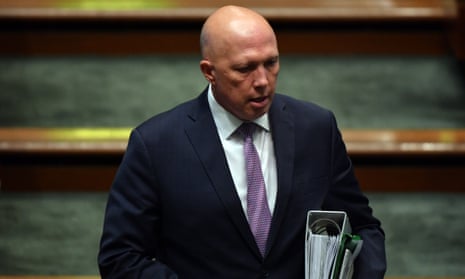Lawyers for Peter Dutton have suggested refugee activist, Shane Bazzi, may have made a “tactical” decision not to give evidence in a defamation trial to avoid questions about alleged malice.
On the second and final day of hearings, Dutton’s counsel, Nick Ferrett, told the federal court he had wanted to ask Bazzi why a tweet suggesting the former immigration minister was a “fascist” should not be seen as evidence he had sought “specifically to wound” Dutton.
Dutton is suing Bazzi over a tweet describing him as a “rape apologist” posted on 25 February. On Wednesday the court heard submissions on the tweet’s meaning and evidence from Dutton that he was deeply offended by it.
On Thursday, Justice Richard White heard arguments on Bazzi’s case that if he did defame Dutton, defences of fair comment and honest opinion should apply. Dutton has argued the tweet is not protected by honest opinion because Bazzi was “actuated by malice”.
Dutton has cited a tweet on 4 March, in which Bazzi said: “Dutton is a rape apologist and a fascist who abuses women and children… Fucken scumbag.”
Ferrett began Thursday’s hearing by rhetorically querying “where is Mr Bazzi?”
Although Ferrett accepted the onus was on Dutton to prove malice, he said “one might have thought … [Bazzi] might want to explain” why the 4 March tweet did not indicate an intention to aggravate Dutton.
Ferrett noted earlier on 25 February Bazzi had called Dutton a “fascist and a torturer”, and said this was “the sort of thing I would have liked to put to him to have him explain why that oughtn’t be seen as evidence of his intention not just to discuss something of public importance but specifically to wound Mr Dutton”.
Ferrett noted Bazzi was “well-represented” and submitted that the “failure to give evidence might be seen as tactical” and allowed the court to draw an inference on malice.
On the merits of the defences, Justice White intervened to question whether rape apologist “involves some element of characterisation and evaluation of [Dutton’s] conduct” and suggested it did not describe an “objective feature” such as “Mr Dutton is tall”. Ferrett responded that the tweet was a “bald accusation” that did not involve any evaluation.
On damages, Ferrett said they were “particularly important … not only to salve hurt feelings but as vindication”. “One of the things about this medium … is that once something is said, particularly something inflammatory, it is republished over and over.
“Vindication … is more necessary for the person who has been to defamed to be able to say ‘this lie has been nailed’ and here is the judgment which says as much.”
Bazzi’s case on “fair comment” argues the tweet was “based on facts which were stated, sufficiently indicated or notorious”.
Ferrett submitted that Dutton’s comment on 25 February that he did not know the “she said, he said” detail of Brittany Higgins’ sexual assault allegation was not sufficiently notorious to be relied on by Bazzi for the purpose of the defence.
Bazzi’s counsel, Richard Potter, responded that the remark, made at a press conference and reported in at least two news items, was sufficiently notorious to ground the opinion.
“In the world of this social media platform it is common … that it is taken for granted that the news of the day is capable of being commented on without reciting the whole news of the day,” he said.
Bazzi’s tweet included a link to a June 2019 Guardian Australia article reporting comments the then-home affairs minister had made on Sky News alleging women had been “trying it on” in claiming they were raped and needed an abortion as part of a ploy to get to Australia for medical treatment from refugee centres on Nauru.
Potter submitted the link allowed readers to “click through and judge for themselves” the basis of the opinion expressed.
Potter noted that article included the fact that in 2016 the federal court found Dutton had breached his duty of care to a woman who became pregnant as a result of rape, and exposed her to serious medical and legal risks in trying to avoid bringing her to Australia for an abortion.
On Wednesday Bazzi’s counsel, Potter told the hearing the ordinary, reasonable reader “would not understand” the tweet to mean Dutton was condoning or excusing rape when read in conjunction with the Guardian Australia news link.
Ferrett responded on Thursday that “nobody – whether it is lawyer, a priest, or a man walking down street – thinks ‘rape apologist’ means anything other than excuse or condones rape”.
The hearing concluded late on Thursday morning. Justice White reserved his decision. Guardian Australia contacted Bazzi for comment.
